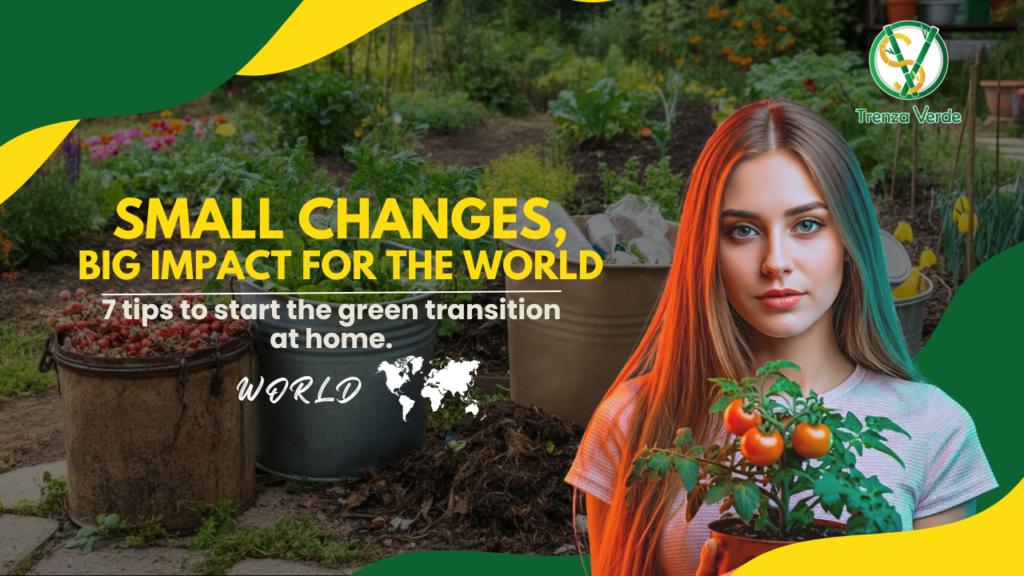The idea of saving the planet might seem like a monumental and romantic task, but the truth is, each of us can make a significant difference right from the comfort of our homes. While collective action and national policies play a vital role in environmental sustainability, everyday small actions also have a real impact on our communities. You don’t need to make radical changes or spend money to take action. With just a few simple habits, we can help create a greener, cleaner, and healthier world for future generations. Here at Trenza Verde, we’re sharing some easy, effective, and accessible practices that we can integrate into our daily lives to protect the environment while also improving our quality of life and that of our community.
Grab a pen and paper, and jot down these simple tips you can start using at home!
1. Separate Waste Properly: The Foundation of Home Recycling
The first step in contributing to the care of the environment is learning how to separate waste correctly. Instead of tossing everything into one bag, we can sort our trash into different categories: organic waste, plastics, glass, metals, and paper. This way, recyclable materials can be sent to recycling centers where they will be processed and reused.
Best Practices:
-
Use separate bins or bags to keep organic waste separate from recyclables.
-
Make sure to rinse out plastic or glass containers before recycling them so they can be processed properly.
-
Find out where the nearest recycling drop-off points are and take your recyclables there.
By taking these small steps, we can make a big difference in reducing waste and protecting our planet. Plus, these habits are easy to adopt and won’t cost you a thing. Ready to get started? Let’s dive into even more ways we can help out!
2. Homemade Composting: Turning Organic Waste into Richness
Composting is a natural process where organic waste, such as fruit and vegetable peels, dry leaves, and coffee grounds, breaks down to form a nutrient-rich fertilizer. This compost can be used in your plants, gardens, and vegetable patches, reducing the need for chemical fertilizers.
Best Practices:
-
Store food scraps in an appropriate composting container.
-
Maintain a good balance between dry materials (like leaves or paper) and wet materials (such as food scraps) to ensure proper decomposition.
-
If you don’t have a garden, consider gifting your compost to friends or family who have gardens.
3. Upcycling: Giving New Life to Old Items
Upcycling, or creative recycling, is the process of transforming items that would otherwise be thrown away into useful and original products. You can tackle upcycling projects with materials like cans, wood, glass bottles, old clothes, and more. It’s a fun way to reduce waste while letting your creativity run wild.
Best Practices:
-
Turn an old t-shirt into a reusable shopping bag.
-
Use glass jars to create small vases or organizers.
-
Reuse old wood or pallets to make furniture or unique decor pieces.
You can also explore local upcycling workshops in your city that specialize in reviving clothing and accessories, giving them a fresh and stylish new life.
By embracing composting and upcycling, we not only contribute to reducing waste but also add a personal touch to our homes and communities—while helping the planet along the way! Ready to try it out? Let’s make sustainability fun and practical!
4. Reducing Single-Use Plastic Consumption
Single-use plastics are one of the biggest threats to our environment. Every time we opt for disposable plastic products, we’re creating a huge amount of waste that takes hundreds of years to decompose. Replacing these items with reusable alternatives is a major step toward reducing our ecological footprint.
Best Practices:
-
Use reusable bags when shopping at the supermarket or your local stores.
-
Avoid plastic packaging and choose products with recyclable or reusable containers (like thermoses or glass bottles).
-
Bring your own water bottle or coffee cup to work to avoid using single-use plastic bottles.
5. Saving Energy and Water: Protect Your Resources
Small actions, like turning off the lights when you leave a room or turning off the tap while brushing your teeth, can have a big impact on reducing energy and water consumption. Additionally, using energy-efficient appliances is essential to lowering your household’s energy use.
Best Practices:
-
Turn off appliances and lights when not in use.
-
Use LED bulbs, which consume less energy.
-
Install low-flow devices on showers and faucets to save water.
-
Wash clothes on low heat and always fill the washing machine before running it.
By making these simple changes in our daily routines, we can significantly contribute to resource conservation and energy efficiency, all while keeping costs low and promoting sustainability. It’s about being mindful of the resources we use and making choices that benefit both us and the planet!
6. Choose Local and Sustainable Products
Consuming local and seasonal products not only supports small producers but also reduces the carbon footprint associated with transporting goods from far-off places. By choosing organic foods and products with sustainability certifications, you’re promoting farming and production practices that respect the environment.
Best Practices:
-
Buy fresh food from local markets, especially seasonal items.
-
Look for products with eco-friendly or sustainable labels.
-
Reduce consumption of processed and packaged foods.
7. Create an Urban Garden: From Home to Plate
If you have space at home, starting an urban garden can be a fantastic way to grow your own food and reduce the environmental footprint of the products you buy. It’s not only a relaxing activity, but it also gives you access to fresh, chemical-free produce.
Best Practices:
-
Start with easy-to-grow herbs and plants like basil, mint, and cilantro.
-
If you don’t have a garden, you can grow plants in pots or even on your kitchen windowsill.
-
Use homemade compost to nourish your plants.
Having your own urban garden allows you to connect with nature and see firsthand how our food is grown. Plus, it’s a rewarding way to reduce waste and enjoy healthy, fresh ingredients right at your fingertips! Ready to give it a try? Your home-grown food is just a few steps away!
Let’s Take Action Today!
At the end of the day, caring for the environment isn’t just about big policies or isolated actions—it’s about our daily decisions. Each of us has the power to be a catalyst for change, to make a positive impact through the simplest of actions. It’s not about radically changing our habits or our way of life, but about being mindful and consistent in the choices we make for the benefit of everyone. From sorting our waste to choosing local and sustainable products, every small gesture matters. By taking care of what we consume and what we give back to the planet, we are building a healthier and fairer legacy for future generations. With love, commitment, and responsibility, we can be agents of transformation. So why not start today? The planet needs all of us, and together, we can make a big difference. The real magic lies in the small things, because when they add up, they can change the world. Let’s do it for ourselves, for the earth, and for those who will come!

